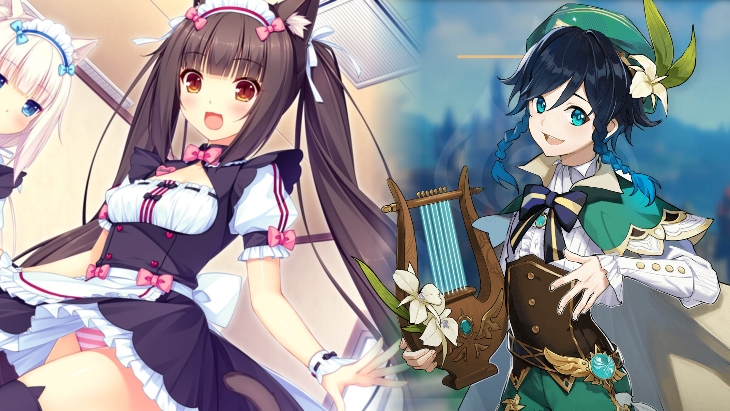
The Chinese government have announced new regulations for games; banning effeminate men, panty shots, declaring Japanese and anime games “dangerous;” and more.
As reported by the South China Morning Post (SCMP), the Chinese government had not announced new game licenses for August and September- a break in the monthly approvals. Along with their prior report of slowing online game approvals to combat gaming addiction (also known as gaming disorder), this move seems to be in preparation for harsher regulations.
A memo was obtained by the South China Morning Post featured information from “a recent internal training course organised by China’s state-backed gaming association for members;“ Along with “several people familiar with the situation.” This may be the same slides that have been shared online. A Niche Gamer reader shared the following translation of the slides below.
The regulatory review of gaming content will be getting stronger. The memo reminded China’s gaming studios that video games are no longer apolitical “pure entertainment,” but an artform that must highlight “a correct set of values” and provide an accurate depiction of (undoubtedly the Chinese government’s view on) China’s history and culture.
The new regulations’ general overview will tackle games that violates Chinese law outright, leaks state secrets, (in SCMP words) “propagates superstition,” spreads violence or gambling, or encourages children to hurt themselves.
Specifically this includes games set in post-apocalyptic worlds where players are encouraged to kill, and games with “blurred moral boundaries.” While the memo says that players shouldn’t have games with “blurred moral boundaries,” or choosing between good or evil.
Gay romance (which should instead only state characters are “best friends”) and “effeminate males” (in appearance or behavior) will also be forbidden; the latter which had already been banned in Chinese TV and film. “If regulators can’t tell the character’s gender immediately, the setting of the characters could be considered problematic and red flags will be raised,” the memo states.
The Chinese government also demands games be accurate to history and world maps; according to them. Games cannot “distort facts or deliberately provoke controversy,” and historical figures must be accurate. In regards to maps, Taiwan has been a frequent victim of Chinese-approving censorship [1, 2, 3].
Games where players destroy “barbarians” could be considered spreading “colonialism,” and games with Japanese warlords would be glorifying “militarism” and “jingoism.” Games depicting the crucifix and other religious icons will also need to do so with caution, along Nazi swastikas. Germany lifted its ban on showing Nazi imagery in games in 2018.
Returning to Japan; the memo notes that “many current Chinese games now look more Japanese than Japanese games.” Criticism was also levied at games with Japanese voice acting and no Chinese subtitles, or games with inaccurate Chinese subtitles. “We experts here know Japanese,” the memo warns, “don’t think we don’t understand that!”
These experts who will be involved in the reviewing process demand to be given the console or phone required to play the game, along with accurate installation instructions. “Don’t be silly and think we don’t know about games,” the memo warns, “Many experts here know more in games than you, don’t think you can escape our review. Be respectful to our review experts.”
Focusing on the memo screenshots we obtained above, Nobunaga’s Ambition is condemned as “barbaric and [imperialism]” for glorifying a foreign nation’s history. Games that glorify the “evil side” of World War 2 are also forbidden, along with playable “war criminals.”
Games with an Anime art-style also targeted outright, as they misuse Japanese culture and are “hard for us to review.” It seems this is out of disgust rather out of challenge, as the memo notes the review experts think “many anime games are negative and dangerous in narrative.”
As reported on Nicchiban, the Chinese government banned multiple anime and the live-action series Ultraman Tiga in an effort to promote “healthy development” among the nation’s youth. Mushoku Tensei: Jobless Reincarnation was removed from the Chinese site Billibilli due to “technical issues”.
Games should also avoid the developer’s “personal agenda,” and that players should not be forced to spend money. Likewise developers should be clear about the “loot box changes.” Loot boxes are noted as being “very forbidden” later in the memo, along with gacha being mentioned under gambling with treasure hunting, recruiting, weapon upgrades, and character stats all based on RNG.
“Anti-society” and “anti-human” games are also to be avoided; such as having the goal to kill people en masse, or surviving in desperate situations without caring for others.
Other forbidden content includes impolite language, drinking, smoking, bars, tattoos, “ascending into deity,” defeating gods (even god-like beings such as Cthulhu), having demons as allies, marriage and having children (presumably rather than having a real wife and child), “playing with female streamers,” and having multiple wives.
The game cannot feature celebrities, IPs, authors, or publishers that have “insulted China in the past;” nor feature negative stereotypes or depictions of China or the Chinese.
Several prior regulations will continue to be enforced. These include depictions of blood or red-hit effects, using words such as “kill, shoot, dead,” or games where players bounty hunt, steal, or commit arson. Violent character classes are also banned, such as assassins and pirates.
Sex appeal is also banned, such as exposure (including panty-shots), and depictions of sex workers. The latter is noted as being against socialist core values, along with casinos, “bad-words,” and “assassin game play that lets players hate each other.”
The bad words would include English, Japanese, and traditional Chinese words, non-standard fonts, “ancient Chinese words,” internet slang and text emoji, “Chinese words that are imported from Japan,”
Games must also not violate copyright, and be completed when submitted for review; with no underdeveloped or unfinished content. They cannot employ “repetitive and copy-pasting art assets.”
Advertising must be accurate, but also cannot use “coming soon” or “to be continued.” “If you did not finish, go back and finish it, we don’t want to see unfinished games.” Bugs are also forbidden for review “we are reviewers, not [quality assurance]!!”
Suffice to say, the game must be accurate to what is submitted for review. Experts must have enough in-game currency to review the game, and be given enough of a description of the game’s world, characters, and gear.
Based on the above list, games featuring post-apocalyptic settings, gay characters, traps, bishōnen, fan-service, historically inspired or alternate history settings, settings accurate to how the world outside of the Chinese government states it, loot boxes, gacha, games depicting gambling, games with Twitch or live-stream integration, smoking, drinking, tattoos, games featuring any military or nation other than China in a favorable light, positive depictions of evil mythological creatures, defeating gods, depicting Nazis, real world religions, games from Japan, and games with an anime art-style would all be forbidden.
Games mentioned in the memo as violating examples include Civilization VI, Azur Lane, Girls’ Frontline (indirectly mentioned as “weapon turning into anime-girl”), Plague Inc. (already banned in China), This War of Mine, Genshin Impact (the character Venti was mentioned and shown regarding effeminate men), and Shin Megami Tensei IV. This list would hypothetically include games already approved for sale.
Will western developers attempt to meet these standards and, more importantly, will western gamers be subject to “global versions” that meet these standards? Could any game meet these standards? While games aimed young children and puzzle games would seemingly be OK, the Chinese government have considered cartoons Peppa Pig and My Little Pony as too dangerous.
It may be accurate to say that popular games from overseas will be banned in China, to prevent “outside culture” from influencing their own. It seems all but games that the Chinese government might as well make themselves would be approved. We will keep you informed as we learn more.
The Chinese government announced in late August that it banned children from playing online video games online video games Monday through Thursday. On Fridays, weekends, and public holidays they can only play for one hour; between 8:00 p.m. and 9:00 p.m. As of November 2019, under 18s were previously limited to 90 minutes per-day, with three hours at weekends and holidays.
The law was designed to curb video game addiction (also known as gaming disorder), along with preventing online games from distracting them from school, family responsibilities, and causing other societal ills. Chinese tech giant Tencent recently lost almost $60 billion USD in stock value; after Chinese state media’s Economic Information Daily described online games as “spiritual opium.”
The Chinese Government also banned under 16s from live-streaming, along with other gaming and internet restrictions as part of their 10-year plan on children’s development.
Image: Genshin Impact official website, Nekopara Vol.1 (via Steam)



